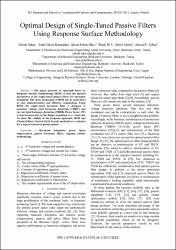| dc.contributor.author | Sakar, Selçuk | |
| dc.contributor.author | Karaoğlan, Aslan Deniz | |
| dc.contributor.author | Balcı, Murat Erhan | |
| dc.contributor.author | Aleem, Shady H. E. Abdel | |
| dc.contributor.author | Zobaa, Ahmed F. | |
| dc.date.accessioned | 2019-10-25T06:15:32Z | |
| dc.date.available | 2019-10-25T06:15:32Z | |
| dc.date.issued | 2015 | en_US |
| dc.identifier.uri | https://hdl.handle.net/20.500.12462/9227 | |
| dc.description | Karaoğlan, Aslan Deniz (Balikesir Author) | en_US |
| dc.description.abstract | This paper presents an approach based on Response Surface Methodology (RSM) to find the optimal parameters of the single-tuned passive filters for harmonic mitigation. The main advantages of RSM can be underlined as easy implementation and effective computation. Using RSM, the single-tuned harmonic filter is designed to minimize voltage total harmonic distortion (THDV) and current total harmonic distortion (THDI). Power factor (PF) is also incorporated in the design procedure as a constraint. To show the validity of the proposed approach, RSM and Classical Direct Search (Grid Search) methods are evaluated for a typical industrial power system. | en_US |
| dc.language.iso | eng | en_US |
| dc.publisher | IEEE | en_US |
| dc.rights | info:eu-repo/semantics/openAccess | en_US |
| dc.subject | Harmonic Mitigation | en_US |
| dc.subject | Power Factor Improvement | en_US |
| dc.subject | Passive Harmonic Filters | en_US |
| dc.subject | Response Surface Methodology | en_US |
| dc.title | Optimal design of single-tuned passive filters using response surface methodology | en_US |
| dc.type | conferenceObject | en_US |
| dc.relation.journal | Proceedings of The 2015 12th Conference-Seminar International School On Nonsinusoidal Currents and Compensation (ISNCC) | en_US |
| dc.contributor.department | Mühendislik - Mimarlık Fakültesi | en_US |
| dc.contributor.authorID | 0000-0001-8418-8917 | en_US |
| dc.contributor.authorID | 0000-0002-3292-5919 | en_US |
| dc.relation.publicationcategory | Konferans Öğesi - Uluslararası - Kurum Öğretim Elemanı | en_US |


















